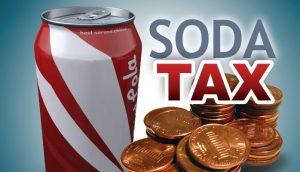
A study which was published in the American Journal of Public Health on February 21, 2019 shows a large reduction of sugary drink consumption by 52% in Berkeley, California, after a levy of the nation’s first soda tax was implemented by the city in 2015.
Just a few months before in November of 2014 voters turned out to pass Measure D, the Berkeley soda tax, which is a 1-cent per ounce tax on drinks with added sweetenerssuch as sodas, coffee and tea drinks and energy drinks.
In 2015, consumption of these sugary drinks dropped by 21% but since then the study shows that figure has more than doubled over the last three years. On the other hand, water consumption showed a rise by 29% over that same period.
Francisco.
Oakland implemented a ‘soda tax’ on sugary drinks in mid-2017 and San Francisco followed suit in 2018.
However, the street intercept surveys showed that residents in Oakland and San
Francisco drank about the same quantity of sugary drinks in 2017 as they did in 2014 showing that the change in drinking habits was uniquely specific to Berkeley and not a sign of a regional trend related to the tax.
Nevertheless, Kristine Madsen, faculty director of the Berkeley Food Institute in UC Berkeley’s School of Public Health and one of the authors of the study says that the study does show taxes on sugary drinks do have a positive impact on reducing consumption of them.
The study also revealed that the positive reduction of sugary drink consumption from taxes levied occurred in neighborhoods with the highest count of diabetes and cardiovasculardiseases. Madsen says that ‘soda taxes’ are one way to counter balance the high impact of commercial advertising.
The taxes in Berkeley are used to support nutrition education and gardening programs in schools as well as to assist local organizations which are educating and working to encourage healthier lifestyles in the community.
Madsen also says that sugar-sweetened beverages, which are linked to obesity, diabetes and cardiovascular disease, cost our nation billions of dollars each year, but they are super-cheap. She goes on to say that they’d cost much more if the health care costs were actually included in the price of the soda and that taxes are one way of taking those costs into account.
Madsen continued in her report that taxes are one of many ways to make really clear what we value as a country. “We want to end this epidemic of diabetes and obesity, and taxes are a form of counter-messaging, to balance corporate advertising. We need consistent messaging and interventions that make healthier foods desirable, accessible and affordable.”
